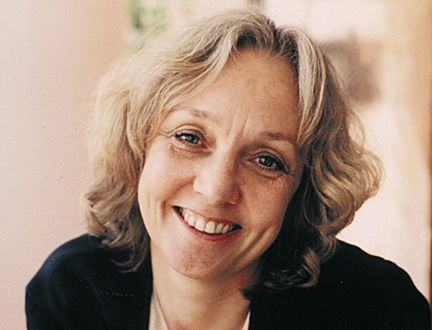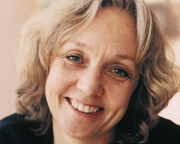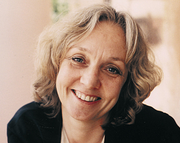As The Proverb Goes…
By Anne Fine
We have commissioned a new piece of writing from fifty leading authors on the theme of 'Elsewhere' - read on for Anne Fine's contribution.
Elsewhere. For me the word had a magic ring right from the start, like the beginning of a fairy tale. Once Upon a Time… Far, Far Away... Long, Long Ago... Elsewhere…
It chimed in, too, with where I longed to be at almost every moment of every day throughout my childhood. Stuck at my desk in school, I yearned to be done with the dull repetition of French verbs and tireless strictures of teachers. I wanted to be home.
At home, constantly interrupted in my reading by demands to carry laundry upstairs, put my shoes neatly in the cupboard or take my turn with the washing-up, I longed to stroll back under that cool brick archway that signalled the divide between chaotic family life and all those quiet bursts of concentration over pens and workbooks.
Things didn’t change when I went off to university. It was a two hour journey home – long enough for the family you’d left to be ignored if you were happy where you were, but not too far to keep you from snatching up a bag and leaving your hall of residence on a whim if you were homesick. I went home often. But within minutes one of my parents would be nagging me to take my coat off the back of that chair and hang it on a hook, remarking (none too kindly) on what I was wearing, or reading me something from the newspaper I was just learning to despise.
And I’d start lying. ‘I can’t stay more than one night. I have a seminar at two tomorrow.’
Restless, my mother called me. And maybe she was right, for I am tense by nature, gnawing my fingernails until they bleed. But if it was simple restlessness then surely I would have taken much better to a married life which led to two years here and one year there, six months in this place followed by a year in that. After the seven years so many fairy tales tell us we have to wait for what we want, I jumped ship, wanting to be back where there is frost and fog and gales, and snow that comes as a surprise rather than as a settled fact of life.
So I suspect my craving to be elsewhere was something different: the sneaking, if irrational, belief that somewhere else my real true life was waiting for me – maybe in London, where I’d go to concerts every night, have lunch with my publishers, see every film; perhaps in a windswept cottage on the coast where I’d be so alone I could write longer, better books; perhaps in Seville or Paris.
Then one day, turning on the radio to hear the news, I caught the very last words of some presenter blandly wrapping up the programme before. ‘So there we have it. As the old proverb goes, “Here is everywhere and everywhere is here.” Thanks to my guests…’
What drivel, I remember thinking. The sort of empty, double-ended, sub-Maharishi tosh that you might take for wisdom only if you were stoned out of your skull. I couldn’t even track down the proverb. (Sayings like Seneca the Younger’s “He who is everywhere is nowhere” kept popping up, but that’s quite different.) For all I know, someone misread the script, or I misheard. But still that little trail of words had put a thumbprint on my life and I began to notice the sort of small exchanges my partner and I had been having for years.
‘Have I been to Sienna?’ I’d ask.
‘Yes. Yes, you have. With me.’
‘I don’t remember.’
‘There was a bat in the room.’
‘Oh, yes. Well, have I been to Cagliari?’
‘Yes. For a festival. Only last year.’
‘I thought that was in Sardinia.’
‘It was.’
If you don’t know where you have been, what is the point?
Then even the future started getting blurry. People would ask if I could come to supper, or give a talk. ‘I’m not quite sure. I think I’m somewhere at the end of this month.’
‘Oh? Somewhere nice?’
And I could barely answer, because I hadn’t bothered to decide. All that I’d noticed was a rising sense of irritation at the sight of the thick black line I’d drawn across those days on the work calendar.
Then one day, proofreading a fresh edition of my first novel for adults, I came across a line I’d written over twenty years before. My hideously scarred and sexually sadistic university teacher remarks in The Killjoy of his quiet life: ‘The more closely each of my days mirrors the one before, the more contented I am.’
Could I be turning into one of my own murderous characters? But Ian Laidlaw had been middle-aged, so maybe the burgeoning attraction of keeping life more settled was to do with that, in the same way that, as you get older, it is easier to see the point of all things quiet and still: paintings and sculptures; silence. Yet everyone else my age seemed to be cantering around the globe with even more enthusiasm than before, and even the real oldies seemed to do nothing but rush from one end of the world to the other.
No, it was definitely me. And as the days went by I realised that the haunting snippet from the radio had eaten into my soul and changed me. Now, like the staid character in Philip Larkin’s Poetry of Departures, who feels the elemental thrill we all do when he hears the words,
He chucked up everything
And just cleared off,
but then dismisses the idea, my choice was made. The craving to be somewhere else had all but died.
And I was grateful for it – and still am, especially valuing the second half of this peculiar notion that changed my life: the part that says ‘everywhere is here’. I’ve found that I’ve stopped trying to make the most of time spent in strange cities, forever hurrying off to see that art gallery before it closes, or squeezing in a visit to those ruins before my talk. I’ve learned the art of treating every hotel bedroom as if it were truly mine, and getting on with things I’ve always preferred doing anyway – writing in bed or reading for hours in the bath.
From time to time, of course, I’ve stopped to wonder if all I’ve done is grown more dull and idle, and given up on some of the richness that’s out there in life. But I don’t think that can be true because the magic of the word ‘elsewhere’ has travelled with me through this change of habit. It still gleams like a celestial city on a hill, unspoiled and unreached.
The only reason I’m no longer restless is that I now know I can take ‘elsewhere’ along with me.
Copyright © 2010, Anne Fine. All rights reserved.
Supported through the Scottish Government’s Edinburgh Festivals Expo Fund.
Look, Listen & Read
- 2026 Festival:
- 15-30 August
Latest News
 Major new partnership with Celtic Connections
Major new partnership with Celtic Connections






